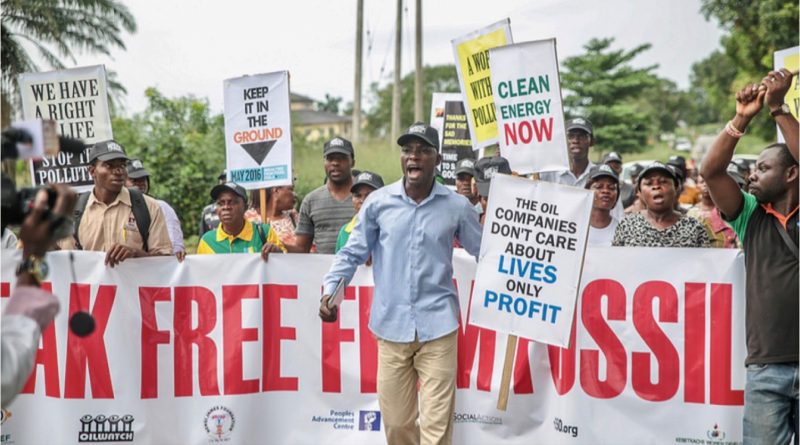OPINION: ONLY A GLOBAL GREEN NEW DEAL WILL WORK

Climate march in Nigeria. Photo: 350.org

It will cost the nations of the world roughly $73 trillion to transition to completely renewable energy by 2050, according to a report from Stanford University. The expense will pay for itself in under 7 years. The shift to a zero-carbon global economy will also create 28.6 million more full-time jobs than if nations continued their use of fossil fuels at current levels. After the payback period trillions of dollars will be saved annually.
Only about 10% of the $73 trillion will be required to transition the United States. So that leaves a lot of money that needs to be spent outside the U.S., much of it in poor, developing nations. These nations don’t have the resources to make those investments themselves, but they are critical to stopping global warming. The developing nations, excluding China, collectively account for more emissions than any nation, including China or the United States.
A Green New Deal, domestic or global, will require much more than simply transitioning to 100% renewable energy and millions of new jobs. It will need to address everything from racial equity, to a just transition for workers, farming and food practices, the availability of family planning for those who want it, education for women and girls, reforestation, and management of refrigerants. But the transition to zero-carbon energy is key and illustrates the need to think globally, as well as domestically.
The Transition In The United States Is Key
The transition to a zero-carbon economy in the U.S. is absolutely vital. We are the second largest emitter of greenhouse gasses in the world. China currently emits the most, but per capita emissions in the U.S. are more than twice those of China. The U.S. also has a special responsibility to reduce emissions given that cumulatively we have emitted more greenhouse gases than any other nation and therefore played the largest role in creating the climate crisis, despite having only 4.25% of the world’s population.
If We Lack A Global Focus We Will Fail
Too often we climate activists have been so focused on the importance of the U.S. cleaning up its own act and transitioning to carbon-free energy, that we have not put enough attention on the global aspects of the problem. The U.S. could meet all the United Nations targets for transitioning to renewable energy, and climate change could still gallop away at unmanageable, catastrophic speed, if emissions are not cut in the developing nations.
“Grand Bargain”
At the heart of the Paris Accords in 2015 was a “grand bargain”: developing countries agreed to join developed ones in cutting emissions, and developed countries agreed to mobilize resources to help developing nations pay for climate action. The plan was that the developed nations would provide $100 billion annually by 2020. That amount is not nearly large enough to deal with the magnitude of the problem, but the developed nations have not yet contributed that amount cumulatively over 5 years, much less prepared to provide the full amount annually.
Transitioning developing nations to renewable energy requires very large financial investments. When you need a lot of money, you can only get it from those who have a lot of money. In this case, that’s the developed nations. In short, if the developed nations, in particular the United States, don’t mobilize major funding for climate action in developing nations, we are all toast.
Bernie Sanders’ climate plan called for significant U.S. funding of the UN’s Green Climate Fund, a program that helps poor countries develop renewable energy rather than relying on fossil fuels. Joe Biden’s new climate plan includes a pledge to “recommit the U.S. to the Green Climate Fund.” Both of these are inadequate, but suggest that some politicians are beginning to believe this issue can be raised publicly.
Climate Debt Of The United States
The rising sea levels, crop failures, heat waves, and catastrophic storms in developing nations caused by climate change are the result of the greenhouse gasses put into the atmosphere by the U.S. and other developed nations. We not only played the largest role in causing the problem, we also got rich doing it. If we apply the principle that “the polluter pays,” — then the U.S. owes the greatest “climate debt” of any nation in the world.
While it seems clear to me that we have a moral obligation to pay our climate debt — to pay to solve the problem we, and others, created for the world — there’s another perspective that may be easier to win some people over to. It turns out that a dollar spent on creating renewable energy in a developing nation generally results in a larger reduction in emissions than a dollar spent in a rich nation. So if your goal is reducing global greenhouse gas emissions, it’s efficient to spend money on renewable energy projects in poor nations.
Building Popular Support
When we talk about trillions of dollars and supporting the development of renewable energy in developing nations it’s easy for any of us to feel powerless and unable to have much impact. However, the big obstacle to the U.S. doing what needs to be done in this regard is not financial, it is the lack of popular pressure to think globally, to provide funds to nations made up primarily of people of color, and to recognize the necessity of funding green development in poor nations.
In recent years we’ve gotten most of the U.S population supporting climate action. Now let’s get more people thinking globally about the problem. Let’s get more people in the U.S. understanding the necessity of our funding renewable energy in poor nations. Let’s talk with people we know, join local climate organizations, use social media, and write letters to the editor and to our elected representatives. We are all in this climate crisis together with people of all the nations of the world.
Russ Vernon-Jones was the Principal of Fort River Elementary School from 1990-2008. He is a co-facilitator of the Coming Together Anti-Racism Project in the Amherst area. He co-chairs the Racism-Climate Change Connections working group of Climate Action Now of Western Mass, and blogs regularly on climate justice at www.RussVernonJones.org.
